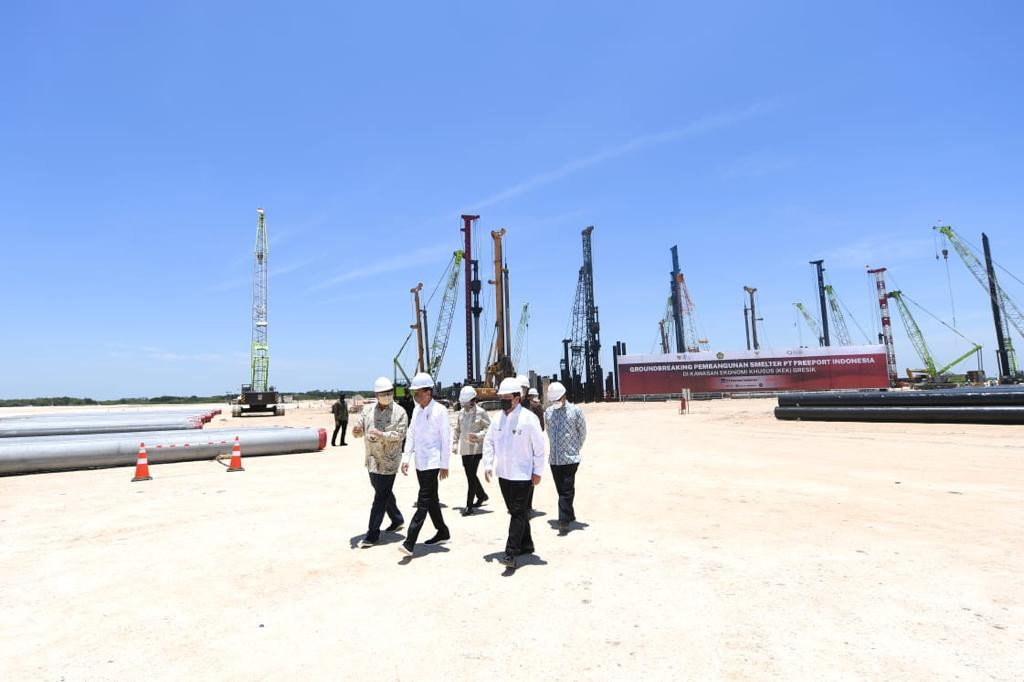Popular Reads
Top Results
Can't find what you're looking for?
View all search resultsPopular Reads
Top Results
Can't find what you're looking for?
View all search resultsForget protection: Jokowi tells SOEs to get out of their comfort zone
President Joko “Jokowi” Widodo says state-owned enterprises (SOEs) should no longer be shielded by the government and should look for international partners.
Change text size
Gift Premium Articles
to Anyone
P
resident Joko “Jokowi” Widodo has said state-owned enterprises (SOEs) should no longer be shielded by the government, as it makes them feel too comfortable within their respective industries.
Injecting state capital into ailing SOEs is one of the practices Jokowi appears keen to dispense with, having said previously that the government had afforded SOEs such treatment too often.
He said he believed that doing so meant that many SOEs lacked courage to compete and reluctant to take risks. SOEs, he said, should adapt their business models to current trends like Industry 4.0, technological disruption and the pandemic, he added.
“So, no more protection [for SOEs]. That’s it. Forget protection,” Jokowi said in an address to SOE directors during a visit to East Nusa Tenggara on Thursday.
“If you ask me, just close them! There is no need to save them, if that's the case,” Jokowi said with regard to SOEs that were unable to adapt.
SOEs have been relying heavily on support from the government, which plans to disburse Rp 72 trillion (US$5.127 billion) in 2022 to help debt-laden SOEs or to streamline the government-assigned projects they are carrying out.
Some SOEs also benefit from good ratings from credit rating agencies despite global uncertainty or internal financial problems thanks to direct or indirect government backing.
Read also: Govt aims to spend big on SOEs to keep infrastructure dream alive
Jokowi noted that only a handful of SOEs met his expectations, namely SOEs in the banking sector and state-owned telecommunication company Telkom, while SOEs in infrastructure and transportation lagged behind.
“The fastest way to adapt is through partnerships. Look for the best global company, engage with them. I’m sure they will be interested in us,” Jokowi said.
Deputy SOEs Minister Pahala N. Mansury concurred, saying it would be difficult to improve the efficiency of SOEs without partnerships.
Pertamina International Shipping, an integrated marine logistics subholding of Pertamina, as well as the newly formed state-owned port holding company PT Pelabuhan Indonesia II were among the SOEs interested in partnerships.
“Right now, we are trying to find the right partners with the help of [Indonesia’s wealth fund] INA,” Pahala told the audience during a virtual panel discussion on Saturday.
In addition, the ministry has announced plans to promote innovation in SOEs through partnerships in fields such as bioscience, robotics and digital technology.
The first of these, Pahala said, was related to pharmaceuticals and vaccines, while the second could be implemented in the mining sector. As for the last, he hoped healthcare services, including telemedicine could be improved.
Read also: Jakarta-Bandung high-speed train gets bigger govt backing after cost overrun
Institute for Development of Economics and Finance (Indef) executive director Tauhid Ahmad told The Jakarta Post on Monday that it would be hard weaning SOEs off state support as the government had been relying on SOEs to carry out infrastructure development and other assigned tasks.
Therefore, fixing SOEs’ performance could prove challenging, as those projects often were the cause of their debt or poor performance, meaning they would remain in need of state help, especially capital injections.
“There are a lot of assignments for SOEs. If the government is serious, then some SOEs must be allowed to reject some of the projects that are not feasible financially and economically,” Tauhid said.
In a move that points in the opposite direction of his declared intention, Jokowi recently signed a presidential regulation allowing state budget intervention in the Jakarta-Bandung high-speed railway, a project blighted by significant cost overrun and multiple delays.
Meanwhile, Center of Economics and Law Studies (CELIOS) director Bhima Yudhistira told the Post on Monday that the idea of rescinding protection could be good for businesses as a whole, if the government could pull it off.
He argued that government protection in some areas had resulted in unhealthy competition that limited private-sector potential. On the other hand, SOEs had been unable to increase their performance effectively due to constant protection, while poorly performing ones were left unscathed.
“If some SOEs turn out to be in a poor state after revoking their protection, then we know which companies are underperforming and no longer need to be kept going,” Bhima said.
However, he said the government should handle the matter with the utmost caution, as not all sectors could be freed from protection, arguing that full privatization could harm the public interest.










